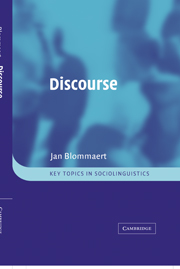Book contents
- Frontmatter
- Contents
- Preface
- Acknowledgments
- 1 Introduction
- 2 Critical Discourse Analysis
- 3 Text and context
- 4 Language and inequality
- 5 Choice and determination
- 6 History and process
- 7 Ideology
- 8 Identity
- 9 Conclusion: Discourse and the social sciences
- Notes
- Appendix: English translations of the documents in chapter 5
- Glossary
- References
- Index
1 - Introduction
Published online by Cambridge University Press: 02 December 2009
- Frontmatter
- Contents
- Preface
- Acknowledgments
- 1 Introduction
- 2 Critical Discourse Analysis
- 3 Text and context
- 4 Language and inequality
- 5 Choice and determination
- 6 History and process
- 7 Ideology
- 8 Identity
- 9 Conclusion: Discourse and the social sciences
- Notes
- Appendix: English translations of the documents in chapter 5
- Glossary
- References
- Index
Summary
What are we talking about?
Power is not a bad thing – those who are in power will confirm it. They will argue convincingly that power is necessary in every system, for it is often that which allows the system to function in particular ways, without which the system would disintegrate or cease to operate effectively. Yet, power is a concern to many people, something that is easily translated into topics of discussion or narration. Power, its actors, its victims, and its mechanisms are often the talk of the town, and our everyday conversations, our mass media, our creative arts gladly use power as themes or motifs in discourses on society at large. Few stories are juicier than those of a president brutally abusing his power for his own personal benefit or for his own personal wrath against competitors for power – All the President's Men was a great movie. Few individuals are more fascinating than those who embody and emanate absolute power and are not afraid of wielding it in unscrupulous ways – Stalin, Napoleon, Mobutu, W. R. Hearst, and Onassis were all culture heroes of some sort in their days and afterwards. And scores of scholars ranging from Plato over Hobbes, Machiavelli, Marx, Gramsci to Foucault and Althusser have all theorised on the nature of power. Thus, we seem to have a strangely ambivalent attitude towards power: it attracts as well as repels; it fascinates and abhors at the same time; it has a beauty as well as an ugliness to it that match those of few other phenomena.
- Type
- Chapter
- Information
- DiscourseA Critical Introduction, pp. 1 - 20Publisher: Cambridge University PressPrint publication year: 2005
- 1
- Cited by



